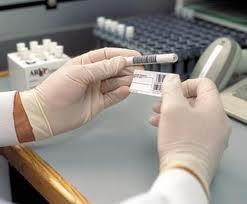Fully automated approach to medical laboratory testing emphasizes automated sample documentation
Pathologists and clinical laboratory administrators know that tracking individual tubes of patient specimens continues to be a huge challenge for medical laboratories. Now, researchers in Germany may be on the way to solving the problem with their invention of “smart” test tubes.
Researchers at the Fraunhofer Institute for Biomedical Engineering (IBMT) in Saarland developed a test tube that interacts with a central control network, according to a press release. Their primary goal is to enable specimen data to be processed automatically, particularly with regard to documentation.
Eliminating Need for Medical Laboratory Techs to Manually Enter Data
In Germany, it is common for medical laboratory technicians to manually write information on test tubes. More recently, barcoding and scanners have speeded up the specimen tracking process. However, barcoding has a drawback. The information contained in the barcode cannot be edited, the press release noted.

Although specifically designed as a solution to automate manual tube labeling methods commonly used in medical laboratories in Germany, the new “smart test tubes” developed by researchers at the Fraunhofer Institute for Biomedical Engineering (IBMT) in Saarland can be used by clinical laboratories in other countries. The smart test tubes have an embedded chip that allows data from analyzers to be written to the chip. (Photo copyright ARUP Laboratories.)
Researchers at IBMT developed a test tube with a tiny microchip embedded into the plastic. When the test tube is placed in an analyzer, equipment can record details onto the embedded chip. In this way, the chip can store a specimen’s entire history. That means there is no need for a clinical laboratory technician to write up a laboratory report on the sample.
“Usually, samples are accompanied by a report slip,” observed IBMT’s Daniel Schmitt, Ph.D., the project leader quoted in the press release. “With test tube chips, the sample and the information are inseparably linked, and there is no way for information to go astray.”
More recently, Schmitt’s research team combined the microchip with a tiny data antenna, similar to those used in radio-frequency identification (RFID) tags. This allows close-range radio communication. The antennas facilitate sample inventory by making it possible to query test tube chips from outside their steel casing storage unit.
The innovative technology is part of IBMT’s program, “Labor der Zukunft”, which means “laboratory of the future” in German.
System Borrows Technology from Automotive Diagnostics
The IBMT scientists, in collaboration with the Technische Universität Braunschweig, developed an integrated network system, known as a smallCAN bus system. It is similar to systems used for automotive diagnostics. The integrated data network system connects all the equipment to a central control point. A bus subsystem transfers data between components inside a computer, or between computers.
The system also makes it possible to access individual pieces of equipment over the internet.
In addition to the smallCAN bus system, the IBMT team developed new software to manage the analysis process. They worked with Soventec GmbH to develop the LabOS laboratory software platform. The management system makes it possible to read a sample’s history on a display screen when the test tube is placed in a reader. The software will also indicate the next steps. The entire process is paperless.
“Using smallCAN and LabOS, we can make lab operations almost entirely self-contained and testing can take place automatically,” stated Schmitt in the press release.
New Lab Automation Technology Deployed in Mobile Labs in Africa
This new technology for medical laboratory specimen tubes is particularly useful in remote areas where blood samples have to travel a long way, according to the press release. An example is the transport of blood infected with HIV from Africa for use in AIDS research.
IBMT and its partners are demonstrating the effectiveness of this new technology via a mobile clinical laboratory that is travelling throughout South Africa. The mobile lab primarily performs lab tests used to diagnose AIDS and tuberculosis.
“Our central control module even gives us access to truck data, for instance the current temperature inside the lab,” declared Schmitt.
He also noted that this automation technology can be put to use in traditional clinical laboratories. “Once you’ve managed to set up that sort of apparatus—in such a tiny space, and to operate on the move—a normal [medical] lab is child’s play,” said Schmitt.
—Pamela Scherer McLeod
Related Information:
“Labor der Zukunft”—Tomorrow’s Laboratory Technology
What is THE DARK REPORT clinical laboratory intelligence service?



